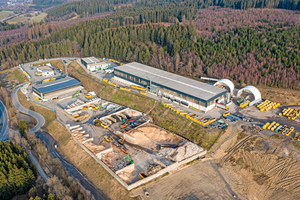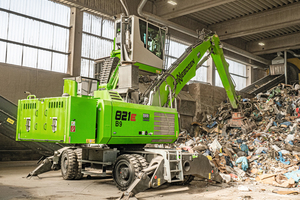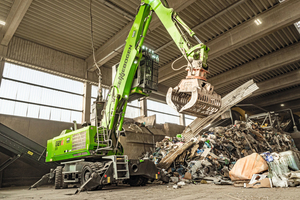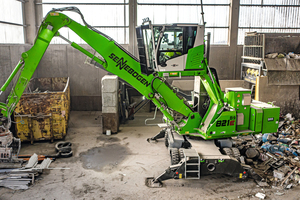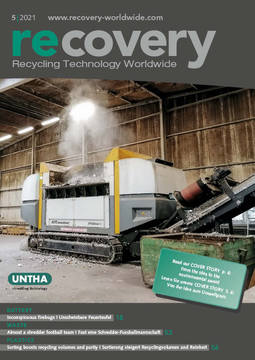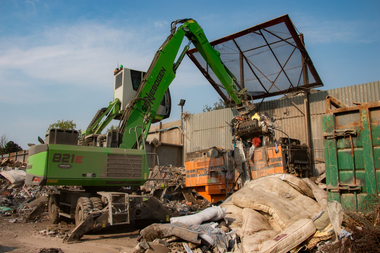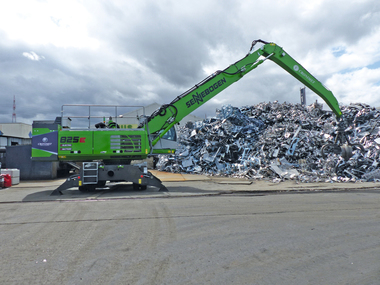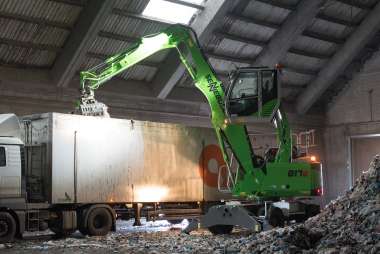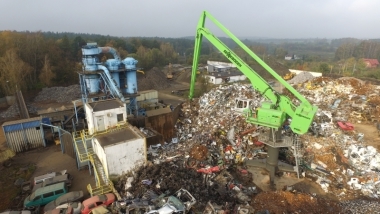Mobile electric material handler SENNEBOGEN 821 E with ceiling power supply and diesel Powerpack
Powered by a 90 kW electric motor and configured as a mobile version, the SENNEBOGEN 821 E moves a huge amount of material every day. It feeds one of Germany‘s most modern waste sorting facilities. Hufnagel Service, a family-run waste management company in Germany, opted for a material handler which is connected to the power supply via a permanently installed cable on the ceiling of the hall. However, the highlight is the diesel generator that replaces the rear ballast: With the SENNEBOGEN diesel Powerpack, the machine can be conveniently moved out of the hall for maintenance work and thus remains more agile than a stationary electric solution.
Innovative electric material handler SENNEBOGEN 821 E in the mobile version
Together with his brother Oliver, Marc Hufnagel runs the family business founded 25 years ago with a staff of around 200. With the commercial waste regulations that passed into law in 2018, the requirements for separating the material to be processed increased enormously. Since then, at least 30 % of recyclable materials must be extracted from commercial waste, which is otherwise destroyed in incineration plants.
As one of the first recycling companies in Germany, Hufnagel made the decision back in 2016 to build one of the most modern waste sorting facilities in Germany on its 12-hectare premises. Since last year, part of this plant has been the mobile electric material handler SENNEBOGEN 821 E: „Initially, we had used a SENNEBOGEN with a diesel engine in the 5000 m² hall in front of the shredder, and noticed that we didn‘t actually move it from the spot, except for maintenance work. Now we feed the plant with an electric material handler including an additional diesel generator at the rear. This 19 kW auxiliary engine allows the machine to remain just as maneuverable as the previous model. However, we are now saving on operating costs in a big way by relying on the electric drive.“
Profitable shift to electric material handler SENNEBOGEN 821 E
According to Marc Hufnagel, many other reasons speak in favor of switching to the environmentally friendly, electrically powered material handling machine: it produces no exhaust fumes and is therefore a welcome alternative for indoor use, can call up its full power immediately after the engine is started, and promises a much longer service life. It also requires less frequent maintenance, as oil or fuel filter do not have to be changed, for example. The 90 kW electric motor, classified according to IP65 enclosure protection, was not installed without reason, Marc Hufnagel further explains: „You can‘t imagine what a big problem the fire hazard caused by lithium-ion batteries has grown into in our industry. When these have not been properly removed before disposal and are subsequently damaged in the shredder, the heat generated usually leads immediately to minor or major fires that are difficult to extinguish.“
Such a risk also exists in his facility. In an event like this, an automated fire extinguishing system that monitors the entire facility with thermal imaging cameras initiates firefighting with foam, even if the electric material handler is still in the hall. „It may happen that our 821 E gets exposed to the foam before it can be driven out of the hall with the help of the Powerpack. The IP65 electric motor is ideally suited for the conditions in our hall: Additionally, we have to use a dust-binding system, which leads to an increased humidity in the air. And all these environmental conditions are difficult to cope with unprotected electrics,“ concludes Marc Hufnagel.

